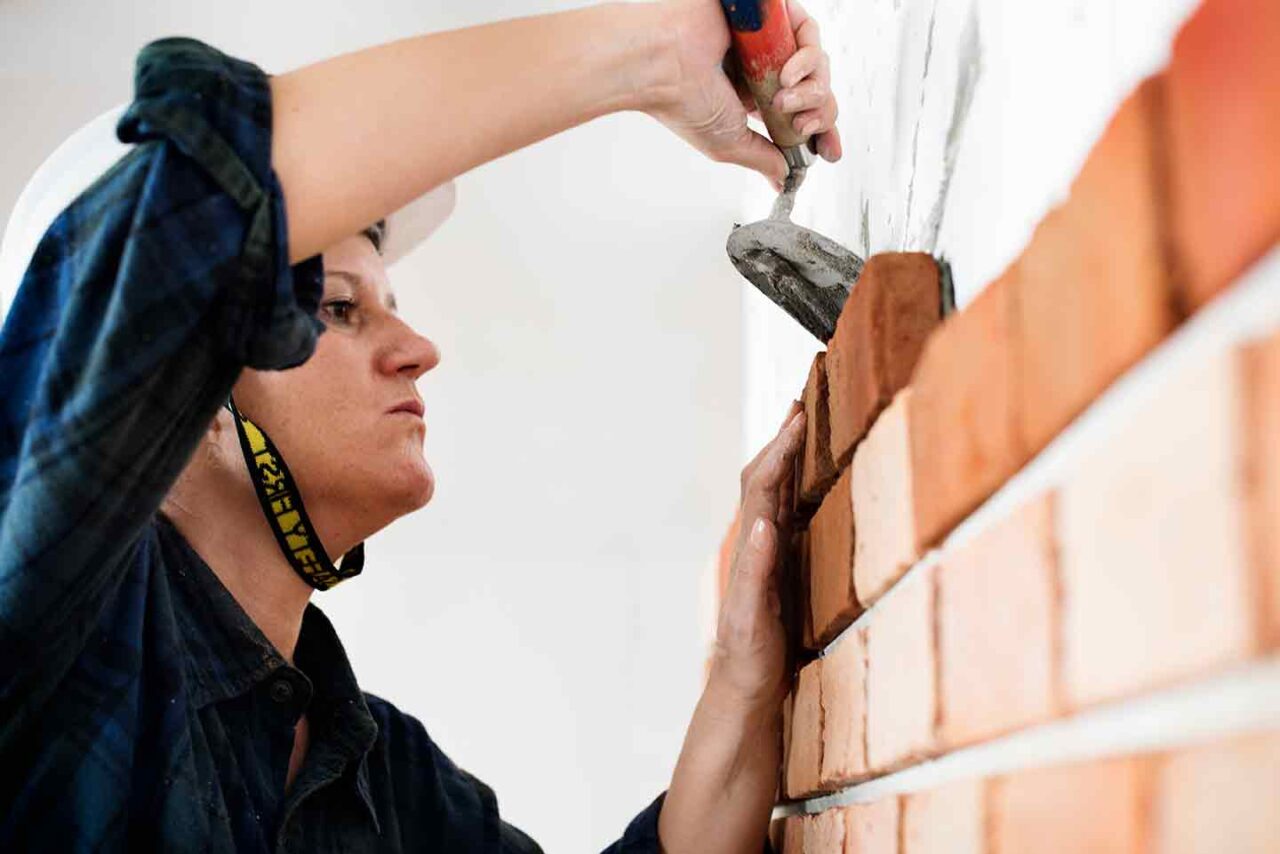Bricklayers use their skill to arrange bricks, pre-cut stone, and concrete blocks into sturdy structures using mortar. Their expertise includes constructing, enlarging, and repairing a wide variety of structures. Bricklayers build everything from foundations to walls, chimneys, and ornate brickwork. But bricklaying can be a journey of accomplishment. With every brick laid and every stone set, bricklayers craft the tangible embodiment of their labor. A sense of fulfillment washes over them at the culmination of a project.
Bricklayers’ work involves more than just building structures; it also entails integrating their skills, passion, and devotion into the structure of our built world. Knowing that every wall, every building, and every work of art they create bears the mark of their hands and the pride of their trade gives bricklayers a natural feeling of accomplishment and great joy.
How To Become A Bricklayer
There are several methods to gain the qualifications and abilities needed to become a bricklayer.
1. College Courses
Bricklaying courses that are part-time or brief are available. These courses are an excellent place to start if you have little to no experience in the area. You can get a foundational understanding of bricklaying methods and practical experience through college courses. They are particularly beneficial if you want to explore the trade before committing to a more extensive apprenticeship.
2. Apprenticeship
Apprenticeships with construction firms are a highly regarded route into the bricklaying industry. During your apprenticeship, you’ll receive classroom and practical instruction., where you work on actual construction projects, and classroom-based education through a college or training provider.
3. On-the-Job Training
This method provides you the chance to observe and learn from seasoned bricklayers, gradually honing the skills necessary to excel in the field.
In addition to official qualifications, many businesses place a high value on enthusiasm, a solid work ethic, and the capacity to follow directions. Demonstrating a passion for the trade can go a long way in securing opportunities. You might require a CSCS card to work on a construction site.
Skills Requirements
In addition to the technical skills required for bricklaying, several additional skills and qualities can significantly benefit someone pursuing a career in this field:
Knowledge of Building and Construction: Understanding the broader principles of building and construction is valuable. It allows you to better integrate your bricklaying work within the context of a larger project.
Attention to Detail: Precision and accuracy are essential in bricklaying. Being meticulous in your work ensures that structures are built soundly and meet quality standards.
Teamwork: Bricklaying is often part of a collaborative effort on construction sites. The ability to work effectively with other tradespeople, contractors, and project managers is crucial.
Adaptability: Construction projects can be dynamic, with changes and adjustments required along the way.
Patience and Composure: Construction sites can be challenging and high-pressure environments. Remaining calm under pressure and having the patience to address unexpected issues is a valuable skill.
Ambition and Drive: A strong work ethic and a desire to excel in your craft can lead to career advancement and personal satisfaction.
Manual Dexterity: Bricklaying is a hands-on job that requires good manual dexterity. You’ll need to be skilled in using various hand tools effectively.
Basic Computer Skills: While bricklaying is a physical trade, basic computer skills can be helpful for tasks like project management, communication, and accessing digital resources related to construction.
You become a more well-rounded bricklayer with these abilities and traits, which also increase your employability and career advancement prospects. They help you operate more productively, communicate more effectively, and manage the demands of a construction site.
What Does A Bricklayer Do?
Bricklayers carry out precise brick-and-mortar construction. They convert architectural blueprints into actual structures and are vital to the construction sector. Here is a thorough explanation of what a bricklayer does:
- Laying Bricks
A bricklayer’s primary responsibility is to place bricks in a precise pattern in order to create walls, buildings, and other structures. This entails aligning and spacing the bricks correctly and placing mortar between the rows to keep them together.
- Applying or Removing Mortar
Using a trowel, bricklayers apply mortar (a mixture of cement, sand, and water) between bricks to create a strong and stable bond. They may also remove excess mortar to maintain neatness and structural integrity.
- Working from Plans and Specifications
Bricklayers work from detailed construction plans and specifications, ensuring that the finished structure conforms to the intended design and dimensions.
- Sealing Foundations
Bricklayers may be responsible for sealing foundations with damp-resistant materials. This helps protect the structure from moisture and ensures its long-term durability.
- Checking Building Alignment
They use tools like spirit levels and plumb lines to ensure that walls and structures are correctly aligned vertically and horizontally.
- Using Tools
Bricklayers are skilled in using different equipment, such as hand tools (trowels, hammers, and chisels), power tools (saws and drills), and brick-cutting machines, to cut bricks to the required size and shape.
- Constructing Arches and Ornamental Brickwork
Some bricklayers specialize in creating arches and ornamental brickwork in addition to normal bricklaying, giving structures beautiful features.
- Repair and Maintenance
Bricklayers are often called upon to repair and maintain existing brick structures, including fixing damaged or deteriorating bricks and mortar.
- Measuring and Setting Out
Bricklayers measure out the building areas accurately and set out the initial rows of bricks and damp courses (layers of moisture-resistant material).
- Working Conditions
Bricklayers work outdoors on construction sites, sometimes at significant heights, and are exposed to various weather conditions.
How Much Could You Earn As A Bricklayer?
The expected income varies based on several factors.
Newly trained bricklayers (Entry-Level) earn from £17,000 to £20,000 annually. On the other hand, those trained with experienced bricklayers (Mid-Level) earn between £20,000 and £30,000 annually. Their income falls within this mid-level range. Senior or master-level bricklayers have a lot of expertise and a solid reputation. They are often responsible for overseeing projects, training junior bricklayers, and handling complex assignments. Their salaries reflect their advanced skills and expertise, ranging between £30,000 – £40,000 per year.
These compensation ranges depend on several factors:
Location: Salaries are higher when there is a high demand for construction workers or where living expenses are higher.
Employer: Salary ranges might vary depending on the kind of employer (such as government organizations, private construction firms, or self-employment).
Overtime: Overtime work can significantly increase a bricklayer’s annual income. Many bricklayers are paid extra for working additional hours beyond their regular schedule.
Additional Skills: Bricklayers with specialized skills, such as working with historical masonry or advanced masonry techniques, may earn higher salaries.
Individuals pursuing a career in bricklaying should thoroughly examine the regional labor market and industry demand for a more accurate understanding of potential earnings in their specific area.
Career Path and Progression
Bricklayers have a variety of professional routes and possibilities accessible to them after finishing an apprenticeship or on-the-job training. Here are some potential career progressions and specializations for bricklayers:
Entry-Level Work
Bricklayers can find entry-level jobs where they use their talents to build projects after finishing their apprenticeship or on-the-job training. These jobs entail learning more practical skills while working under the supervision of more seasoned bricklayers.
Supervisor
With several years of experience, bricklayers can advance to supervisor roles. In these positions, they oversee and coordinate the work of other bricklayers and construction workers on a project. Supervisors ensure that projects are completed efficiently and according to specifications.
Project Manager
Experienced bricklayers may transition into project management roles. As project managers, they are in charge of organizing, planning, and carrying out building projects. This role involves budget management, client communication, and project scheduling.
Estimator
Bricklayers with strong knowledge of construction costs and materials can become estimators. They assess project requirements, prepare cost estimates, and submit bids for construction projects. Estimators play a crucial role in securing contracts for their companies.
Construction Manager
Some bricklayers choose to advance further in their careers by becoming construction managers. They manage the whole construction project, from planning to conclusion. Project managers ensure that work is done to the highest standards, on schedule, and within the allotted budget.
Self-Employed Subcontractor
A lot of seasoned bricklayers choose to launch their enterprises and operate as independent subcontractors. They manage their construction projects, employ their workers, and submit bids on jobs. This path offers a high degree of independence but also involves significant business responsibilities.
Bottom Line
Bricklayers can specialize in various areas of their trade. Some may focus on estimating, where they become experts in project cost analysis. Heritage restoration specialists work on preserving and restoring historic brick structures. Stonemasonry is another specialization involving the use of natural stone in construction. Obtaining a Personal Track Safety (PTS) Card opens up opportunities for bricklayers to work on or near railway lines. This certification is essential for those interested in construction projects involving rail infrastructure. Bricklaying offers a wide range of career paths and opportunities for advancement.
Bricklaying is a rewarding and dynamic career that combines skill, precision, and artistry. Whether you are just starting with college courses, embarking on an apprenticeship, or gaining experience through on-the-job training, there are numerous pathways to success in this field. For more detailed guidance on starting your bricklaying career, including insights into other skilled trades and construction opportunities, visit our comprehensive resources at Finishing Hands. To learn more about our mission and values, visit our About Us page, and if you have any questions or need further assistance, don’t hesitate to reach out through our Contact page. Explore related articles on construction techniques, career advice, and industry trends to help you build a solid foundation for your future.
FAQs
What Qualifications Are Required To Be A Bricklayer?
Physical prowess, endurance, and stamina are necessary traits for a bricklayer. Additionally, have excellent hand-eye coordination and be skilled with tools.
Where Does A Bricklayer Work?
Bricklayers typically work on construction sites, such as buildings, homes, or commercial properties.
Is A Bricklayer A Job?
Yes, being a bricklayer is considered a skilled trade occupation.
What Education Or Training Do I Need To Become A Bricklayer?
You need to finish an apprenticeship program or vocational training program. This entails learning masonry techniques, such as bricklaying, mortar work, and foundation building, both in the classroom and through practical experience.


